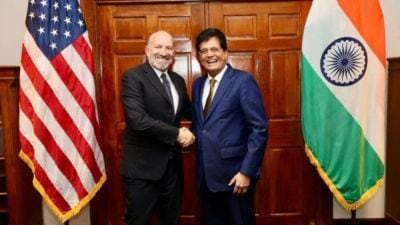Britain votes as Blair looks for 3rd term, US blasts jangle nerves
Britons voted today in an election likely to hand Prime Minister Tony Blair a third term despite anger over Iraq, with blasts at the British...

Britons voted today in an election likely to hand Prime Minister Tony Blair a third term despite anger over Iraq, with blasts at the British Consulate in New York jangling nerves.
Shortly after polling stations opened in Britain, two homemade grenades exploded in a plant-pot in front of the skyscraper housing the UK Mission in Manhattan. Windows were shattered but no one was hurt in the blasts.
There was no immediate claim of responsibility. “No one should jump to conclusions,” New York Mayor Michael Bloomberg said.
Blair, far less popular than when he won landslide victories in 1997 and 2001, cast his ballot in the northern English constituency of Sedgefield just before news of the blast broke.
A prodigiously charismatic leader who brought his party to power after 18 years in the wilderness, Blair saw his trust ratings plummet after deciding to invade Iraq in 2003. He faced accusations he hyped intelligence on Saddam Hussein’s weapons.
His alliance with U S President George W Bush infuriated many traditional supporters of his centre-left Labour party. But he has campaigned on the strength of the economy, which has blossomed throughout his eight years in office.
Blair walked across a football field to vote in a picturesque mining village near Sedgefield with wife Cherie and sons Euan and Nicky, both old enough to vote for the first time.
Blair, who will turn 52 on Friday, says a third term would be his last. He has campaigned alongside his heir apparent, Chancellor of the Exchequer Gordon Brown, the main architect of economic policies that are seen as Labour’s best election asset.
His main opponents, the centre-right Conservatives, backed the war and have had trouble capitalising on Iraq as an issue.
But they have used the case Blair made for the conflict to hammer at his personal credibility, and could benefit if the war persuades Labour supporters to stay home. The anti-war third party, the Liberal Democrats, should gain at Blair’s expense.
‘‘I think people want to be heard. We weren’t listened to over the war and now this is our chance,’’ said Asif Sharief, 49, a shopkeeper voting in Bethnal Green, a once-solid Labour stronghold in East London where the incumbent faces a particularly bitter fight with an anti-war candidate.
But other Labour supporters said it was time to rally.
‘‘The war is over and it’s done with now. They want to get on with the job,’’ said a female pensioner voting in Sedgefield.
Winning a third straight poll would be a first for a Labour leader—only Conservative Margaret Thatcher has done it.
But if Blair’s Parliamentary majority is much reduced, he could have difficulty pushing through his plans, especially health and education reforms opposed by some in his own party.
Blair had a 161-seat majority of 659 members in the outgoing house. There will be 15 fewer seats in Parliament after this election, following a redrawing of the electoral map.
Low turnout could hurt Blair. When he first won in 1997, turnout was 71 percent, but that slumped to 59 percent in 2001.
Five opinion polls today gave Labour leads of between three and six percentage points. The last, in London’s Evening Standard newspaper, put Labour on 38 percent, the Conservatives on 33 and the Liberal Democrats on 23.
But predictions are tricky. Under Britain’s electoral system—unlike the proportional party representation in most European countries—all hangs on the outcome of races in individual districts, many of which are too close to call.
(Reuters)





- 01
- 02
- 03
- 04
- 05


























